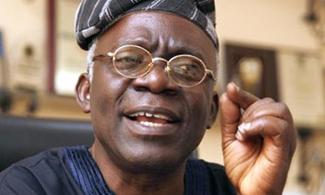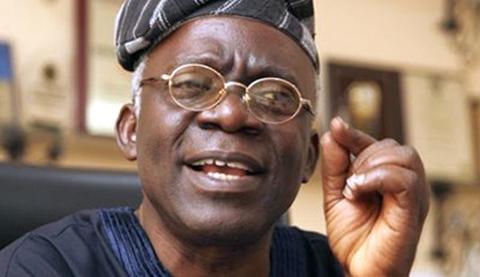
Falana, in a statement on Sunday, argued that Marshall's arrest is illegal considering several judgements by the High Court of the Federal Capital Territory, which has prohibited the area courts in the Federal Capital Territory from hearing and determining criminal cases.
Human rights lawyer, Femi Falana (SAN) says the arrest and subsequent detention and prosecution of Abubakar Marshall, the lawyer who filed a lawsuit on behalf of human rights activist, Omoyele Sowore against businessman and former lawmaker, Ned Nwoko, and the security agency, is illegal.
Falana, in a statement on Sunday, argued that Marshall's arrest is illegal considering several judgements by the High Court of the Federal Capital Territory, which has prohibited the area courts in the Federal Capital Territory from hearing and determining criminal cases.

The legal luminary further said the basis upon which Marshall was arrested was illegal noting that a “surety cannot be arrested, detained and charged with any criminal offence before any court in Nigeria on the ground that a suspect has jumped bail or failed to report for investigation or arraignment”.
He further noted that the lawyer had not committed any offence whatsoever as he called for the immediate withdrawal of the criminal charge erroneously filed before the Upper Area Court in Kubwa.
The statement from Falana reads, “In a bid to justify the arrest of Abubakar Marshall Esq., the Police claimed that the lawyer contravened an unspecified provision of the Criminal Code because he failed to produce a client, Mr. Omoyele Sowore at a police station in the Federal Capital Territory.
“In spite of the indiscretion of Abubakar Marshall to stand surety for Mr. Sowore, his arrest, detention and prosecution by the Federal Capital Territory Police Command cannot be justified under the law on two solid grounds:
“It is on record that the High Court of the Federal Capital Territory has prohibited the area courts in the Federal Capital Territory from hearing and determining entertain criminal cases.
“There are not less than four decided cases of the said High Court which have perpetually restrained Area Courts from entertaining criminal cases. See Bar. Anugom Ifeanyi Chukwu v. Grand Kadi Sharia Court of Appeal Abuja and 2 Ors Suit No: FCT/HC/CV/2107/14); Gladys Chukwu v. Hon. Gambo Garba Suit No: FCT/HC/M/4499/19; Abdulahi v. C.O.P Suite No: M 2621/2019; Mr. Fredrick Chukwu v. Fathi & 1 Ors Suit No: M/4501/2020.
“It is trite law that a surety cannot be arrested, detained and charged with any criminal offence before any court in Nigeria on the ground that a suspect has jumped bail or failed to report for investigation or arraignment.
“The penalty is that the surety is legally obligated to pay the sum stated in the recognizance or bail bond. Before the bail bond can be forfeited, the surety is entitled to show a cause or justify before a Court why it should not be forfeited.
“However, if the surety fails to pay the sum stipulated in the bond, the court shall proceed to recover it from the surety like a fine under the Administration of Criminal Justice Act.
“Sometime in January 2021, Monday Ubani, the current Chairman of the Section on Public Law of the Nigerian Bar Association was arrested and detained for 21 days by the Economic and Financial Crimes Commission on the grounds that one of his clients had jumped bail.
“In condemning the action of the EFCC on that occasion, I pointed out that the senior lawyer had committed no known criminal offence to warrant his arrest and detention.
“When the EFCC refused to release him from custody, he approached the High Court of the Federal Capital Territory for legal redress by filing the case of Monday Ubani v Economic and Financial Crimes Commission (Suit No FCT/HCV/HC/1410/2019).
“In the judgment delivered on January 26, 2021, Sylvanus Oriji J. correctly held that ‘It was argued that suretyship, which is contractual, does not constitute any offence for which the applicant could be arrested and detained.
“In other words, suretyship, as an undertaking before an administrative body whether in respect of a criminal investigation or not, is a civil contract and the remedy for its enforcement lies in a civil action. The suretyship cannot be the basis for the applicant to be subjected to arrest and detention’.
“In view of the several decisions of Nigerian courts on the contractual nature of suretyship, Abubakar Marshall has not committed any offence whatsoever. The authorities of the Federal Capital Territory Police Command are advised to withdraw the criminal charge erroneously filed before the Upper Area Court in Kubwa.”